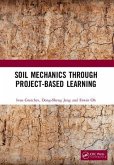Deep Learning based applications for Multimedia Processing Applications
Volume 1 and 2
Herausgeber: Mengxing, Huang; Bhatti, Uzair Aslam; Bazai, Sibghat Ullah; Aamir, Muhammad; Li, Jingbing
Deep Learning based applications for Multimedia Processing Applications
Volume 1 and 2
Herausgeber: Mengxing, Huang; Bhatti, Uzair Aslam; Bazai, Sibghat Ullah; Aamir, Muhammad; Li, Jingbing
- Broschiertes Buch
- Merkliste
- Auf die Merkliste
- Bewerten Bewerten
- Teilen
- Produkt teilen
- Produkterinnerung
- Produkterinnerung
Divided into two volumes, Volume 1 begins by introducing the fundamental concepts of deep learning, providing readers with a solid foundation to understand its relevance in multimedia processing. Volumes 2 delves into advanced topics such as convolutional neural networks, recurrent neural networks, and generative adversarial networks.
Andere Kunden interessierten sich auch für
![Soil Mechanics Through Project-Based Learning Soil Mechanics Through Project-Based Learning]() Ivan GratchevSoil Mechanics Through Project-Based Learning82,99 €
Ivan GratchevSoil Mechanics Through Project-Based Learning82,99 €![Fiber-Optic Fabry-Perot Sensors Fiber-Optic Fabry-Perot Sensors]() Yuan GongFiber-Optic Fabry-Perot Sensors89,99 €
Yuan GongFiber-Optic Fabry-Perot Sensors89,99 €![A Practical Guide to Domestic Energy Saving Technologies A Practical Guide to Domestic Energy Saving Technologies]() Christopher KitcherA Practical Guide to Domestic Energy Saving Technologies35,99 €
Christopher KitcherA Practical Guide to Domestic Energy Saving Technologies35,99 €![How on Earth Do We Live Now? Natural Capital, Deep Ecology and the Commons How on Earth Do We Live Now? Natural Capital, Deep Ecology and the Commons]() David CiscelHow on Earth Do We Live Now? Natural Capital, Deep Ecology and the Commons11,99 €
David CiscelHow on Earth Do We Live Now? Natural Capital, Deep Ecology and the Commons11,99 €![Advances in SAR Remote Sensing of Oceans Advances in SAR Remote Sensing of Oceans]() Advances in SAR Remote Sensing of Oceans72,99 €
Advances in SAR Remote Sensing of Oceans72,99 €![Trolleybus Revolution - UK: The Retrofit Hybrid Revolution Trolleybus Revolution - UK: The Retrofit Hybrid Revolution]() Terence P. O'HalloranTrolleybus Revolution - UK: The Retrofit Hybrid Revolution23,99 €
Terence P. O'HalloranTrolleybus Revolution - UK: The Retrofit Hybrid Revolution23,99 €![M64 Gas Transfer Applications in Water: Addition and Removal M64 Gas Transfer Applications in Water: Addition and Removal]() AwwaM64 Gas Transfer Applications in Water: Addition and Removal169,99 €
AwwaM64 Gas Transfer Applications in Water: Addition and Removal169,99 €-
-
-
Divided into two volumes, Volume 1 begins by introducing the fundamental concepts of deep learning, providing readers with a solid foundation to understand its relevance in multimedia processing. Volumes 2 delves into advanced topics such as convolutional neural networks, recurrent neural networks, and generative adversarial networks.
Hinweis: Dieser Artikel kann nur an eine deutsche Lieferadresse ausgeliefert werden.
Hinweis: Dieser Artikel kann nur an eine deutsche Lieferadresse ausgeliefert werden.
Produktdetails
- Produktdetails
- Verlag: Taylor & Francis Ltd
- Seitenzahl: 746
- Erscheinungstermin: 18. Juni 2024
- Englisch
- Abmessung: 254mm x 178mm
- Gewicht: 1630g
- ISBN-13: 9781032665856
- ISBN-10: 1032665858
- Artikelnr.: 70050116
- Herstellerkennzeichnung
- Produktsicherheitsverantwortliche/r
- Europaallee 1
- 36244 Bad Hersfeld
- gpsr@libri.de
- Verlag: Taylor & Francis Ltd
- Seitenzahl: 746
- Erscheinungstermin: 18. Juni 2024
- Englisch
- Abmessung: 254mm x 178mm
- Gewicht: 1630g
- ISBN-13: 9781032665856
- ISBN-10: 1032665858
- Artikelnr.: 70050116
- Herstellerkennzeichnung
- Produktsicherheitsverantwortliche/r
- Europaallee 1
- 36244 Bad Hersfeld
- gpsr@libri.de
Uzair Aslam Bhatti was born in 1986. He received the Ph.D. degree in information and communication engineering, Hainan University, Haikou, Hainan, in 2019. He completed his Postdoctoral from Nanjing Normal University, Nanjing, China in implementing Clifford algebra algorithms in analysing the geospatial data using artificial intelligence (AI). He is currently working as Associate Professor in School of information and communication engineering in Hainan University. His areas of specialty include AI, machine learning, and image processing. He is serving as guest editor of various journals including Frontier in Plant Science, Frontier in Environmental Science, Computer Materials and Continua, Plos One, IEEE Access etc and has reviewed many IEEE Transactions and Elsevier journals. Jingbing Li, is a doctor, professor, doctoral supervisor, and the Vice President of Hainan Provincial Invention Association. He has been awarded honorary titles of Leading Talents in Hainan Province, Famous Teaching Teachers in Hainan Province, Outstanding Young and Middle-aged Backbone Teachers in Hainan Province, and Excellent Teachers in Baosteel. He has also won the second prize of Hainan Provincial Science and Technology Progress Award three times (the first completer twice, the second completer once). He has obtained 13 authorized national invention patents, published 5 monographs such as medical image digital watermarking, published more than 80 SCI / EI retrieved academic papers (including 22 SCI retrieved papers) as the first author or corresponding author. He has presided over 2 projects of the National Natural Science Foundation of China, and 5 projects of Hainan Province's key research and development projects and Hainan Province's international scientific and technological cooperation projects. Dr. Huang Mengxing is Dean of the School of Information, at Hainan University. He has occupied many roles, such as the leader of the talent team of "Smart Service", the chief scientist of the National Key R&D Program, a member of the Expert Committee of Artificial Intelligence and Blockchain of the Science and Technology Committee of the Ministry of Education, the executive director of the Postgraduate Education Branch of the China Electronics Education Society, and the Computer Professional Teaching Committee of the Ministry of Education, among others. His main research areas include big data and intelligent information processing, multi-source information perception and fusion, artificial intelligence and intelligent services, etc. In recent years, he has published more than 230 academic papers as the first author and corresponding author, has obtained 36 invention patents authorized by the state, and 96 software copyrights; published 4 monographs and translated 2 books. He has won first prize and second prize of Hainan Provincial Science and Technology Progress Award as the first person who completed it; won 2 Hainan Provincial Excellent Teaching Achievement Awards and Excellent Teacher Award. He has presided over and undertaken more than 30 national, provincial, and ministerial-level projects, such as national key research and development plan projects, national science and technology support plans, and National Natural Science Foundation projects. Sibghat Ullah Bazai completed his undergraduate and graduate studies in Computer Engineering at the Balochistan University of Information Technology, Engineering, and Management Sciences (BUITEMS) in Quetta, Pakistan. He received his Ph.D. (IT) in Cyber Security from Massey University in Auckland, New Zealand in 2020. As part of his research, he is interested in applying cyber security, identifying diseases with deep learning, automating exams with natural language processing, developing local language sentiment datasets, and planning smart cities. Sibghat is a guest editor and reviewer for several journals' special issues in MDPI, Hindawi, CMC, PlosOne, Frontier, and others. Muhammad Aamir received the Bachelor of Engineering degree in Computer Systems Engineering from Mehran University of Engineering & Technology Jamshoro, Sindh, Pakistan, in 2008, the Master of Engineering degree in Software Engineering from Chongqing University, China, in 2014, and the PhD degree in Computer Science and Technology from Sichuan University, Chengdu, China, in 2019. He is currently an Associate Professor at the Department of Computer, Huanggang Normal University, China. His main research interests include pattern recognition, computer vision, image processing, deep learning, and fractional calculus.
Volume 1 1. A Novel Robust Watermarking Algorithm for Encrypted Medical Images Based on Non-Subsampled Shearlet Transform and Schur Decomposition Meng Yang
Jingbing Li1
Uzair Aslam Bhatti
Yiyi Yuan
and QinQing Zhang. 2. Robust Zero Watermarking Algorithm for Encrypted Medical Images Based on SUSAN-DCT Jingbing Li
Qinqing Zhang
Meng Yang
and Yiyi Yuan. 3. Robust Watermarking Algorithm for Encrypted Medical Volume Data Based on PJFM and 3D-DCT Lei Cao
Jingbing Li
and Uzair Aslam Bhatti. 4. Robust Zero Watermarking Algorithm for Medical Images Based on BRISK and DCT Fangchun Dong
Jingbing Li
and Uzair Aslam Bhatt. 5. Robust Color Images Zero Watermarking Algorithm Based on Smooth Wavelet Transform and Daisy descriptor Yiyi Yuan
Jingbing Li1
Uzair Aslam Bhatti
Meng Yang
and Qinqing Zhang. 6. Robust Multi-Watermarking Agorithm based on Darknet53 Convolutional Neural Network Dekai Li
Jingbing Li
and Uzair Aslam Bhatti. 7. Robust Multi-Watermarking Algorithm for Medical Images Based on Squeezenet Transfer Learning Pengju Zhang
Jingbing Li
and Uzair Aslam Bhatti. 8. Deep Learning Applications in Digital Image Security: Latest Methods And Techniques Saqib Ali Nawaz
Jingbing Li
Uzair Aslam Bhatti
Muhammad Usman Shoukat
and Raza Muhammad Ahmad. 9. Image Fusion Techniques and Applications for Remote Sensing Images and Medical Images Emadalden Alhatami
MengXing Huang
and Uzair Aslam Bhatti. 10. Detecting Phishing URLs Through Deep Learning Models Shah Noor
Sibghat Ullah Bazai
Saima Tareen
and Shafi Ullah. 11. Augmenting Multimedia Analysis: A Fusion of Deep Learning with Differential Privacy Iqra Tabassum and Dr. Sibghat Ullah Bazai. 12. Multi-Classification Deep Learning Models for Detecting Multiple Chest Infection using Cough and Breath Sound Amna Tahir
Hassaan Malik
and Muhammad Umar Chaudhry. 13. Classifying Traffic Signs using Convolutional Neural Networks based on Deep Learning Models Saira Akram
Sibghat Ullah Bazai
and Shah Marjan. 14. Cloud-Based Intrusion Detection System using Deep Neural Network and Human-in-the-Loop Decision-Making Hootan Alavizadeh and Hooman Alavizadeh. Volume 2 1. A Review on Comparative Study of Image-Denoising in Medical Imaging Nasir Ishfaq. 2. Remote Sensing Image Classification: A Comprehensive Review and Applications Uzair Aslam Bhatti
Jingbing Li
Saqib Ali Nawaz
Huang Mengxing
and Raza Muhammad Ahmad. 3. Deep learning framework for Face Detection and Recognition for Dark Faces using VGG19 with Variant of Histogram Equalization Kirti and Gagandeep. 4. A 3D Method for combining Geometric Verification and Volume Reconstruction in a Photo Tourism system Muhammad Sajid Khan and Andrew Ware. 5. Deep Learning Algorithms and Architectures for Multimodal Data Analysis Anwar Ali Sathio
Prof. Dr. Muhammad Malook Rind
and Dr. Abdullah Lakhan. 6. Deep Learning Algorithms - Clustering and Classifications for Multimedia Data Anwar Ali Sathio
Prof. Dr. Muhammad Malook Rind
and Dr. Abdullah Lakhan. 7. A Non-Reference Low-Light Image Enhancement Approach using Deep Convolutional Neural Networks Ziaur Rahman
Muhammad Aamir
Kanza Gulzar
Jameel Ahmed Bhutto
Muhammad Ishfaq
Zaheer Ahmed Dayo
and Khalid Hussain Mohammadani. 8. Human Pose Analysis and Gesture Recognition: Methods and Applications Muhammad Haroon
Saud Altaf
Kanza Gulzar
and Muhammad Aamir. 9. Human Action Recognition Using ConvLSTM with Adversarial Noise and Compressive-Sensing-Based Dimensionality Reduction Concise and Informative Mohsin Raza Siyal
Mansoor Ebrahim
Dr.Nadeem Qazi
Syed Hasan Adil
and Kamran Raza. 10. Application of Machine Learning to Urban Ecology Mir Muhammad Nizamani
Ghulam Muhae-Ud-Din
Qian Zhang
Muhammad Awais
Muhammad Qayyum
Muhammad Farhan
Muhammad Jabran
and Yong Wang. 11. Application of Machine Learning in Urban Land Use Haili Zhang and Qin Zhou. 12. Application of GIS and Remote Sensing Technology in Ecosystem Services and Biodiversity Conservation Mir Muhammad Nizamani
Qian Zhang
Ghulam Muhae-Ud-Din
Muhammad Awais
Muhammad Qayyum
Muhammad Farhan
Muhammad Jabran
and Yong Wang. 13. From Data Quality to Model Performance: Navigating the Landscape of Deep Learning Model Evaluation Muhammad Akram
Wajid Hassan Moosa
and Najiba. 14. Deep Learning for the Turnover Intention of Industrial Workers: Evidence from Vietnam Nguyen Ngoc Long
Nguyen Ngoc Lam
and Bui Huy Khoi. 15. Deep Learning for Multimedia Analysis Hafiz Gulfam Ahmad Umar. 16. Challenges and Techniques to Improve Deep Detection and Recognition Methods for Text Spotting Anuj Abraham and Shitala Prasad. 17. Leaf Classification and Disease Detection Based on R-CCN Deep Learning Approach Tayyab Rehman
Muhammad Sajid Khan
and Noshina Tariq. 18. Deep Learning for Multimedia Analysis: Applications
Challenges
and Future Directions Dr. Ahmed Mateen Buttar
Muhammad Anwar Shahid
Muhammad Nouman Arshad
and Irfan Ali.
Jingbing Li1
Uzair Aslam Bhatti
Yiyi Yuan
and QinQing Zhang. 2. Robust Zero Watermarking Algorithm for Encrypted Medical Images Based on SUSAN-DCT Jingbing Li
Qinqing Zhang
Meng Yang
and Yiyi Yuan. 3. Robust Watermarking Algorithm for Encrypted Medical Volume Data Based on PJFM and 3D-DCT Lei Cao
Jingbing Li
and Uzair Aslam Bhatti. 4. Robust Zero Watermarking Algorithm for Medical Images Based on BRISK and DCT Fangchun Dong
Jingbing Li
and Uzair Aslam Bhatt. 5. Robust Color Images Zero Watermarking Algorithm Based on Smooth Wavelet Transform and Daisy descriptor Yiyi Yuan
Jingbing Li1
Uzair Aslam Bhatti
Meng Yang
and Qinqing Zhang. 6. Robust Multi-Watermarking Agorithm based on Darknet53 Convolutional Neural Network Dekai Li
Jingbing Li
and Uzair Aslam Bhatti. 7. Robust Multi-Watermarking Algorithm for Medical Images Based on Squeezenet Transfer Learning Pengju Zhang
Jingbing Li
and Uzair Aslam Bhatti. 8. Deep Learning Applications in Digital Image Security: Latest Methods And Techniques Saqib Ali Nawaz
Jingbing Li
Uzair Aslam Bhatti
Muhammad Usman Shoukat
and Raza Muhammad Ahmad. 9. Image Fusion Techniques and Applications for Remote Sensing Images and Medical Images Emadalden Alhatami
MengXing Huang
and Uzair Aslam Bhatti. 10. Detecting Phishing URLs Through Deep Learning Models Shah Noor
Sibghat Ullah Bazai
Saima Tareen
and Shafi Ullah. 11. Augmenting Multimedia Analysis: A Fusion of Deep Learning with Differential Privacy Iqra Tabassum and Dr. Sibghat Ullah Bazai. 12. Multi-Classification Deep Learning Models for Detecting Multiple Chest Infection using Cough and Breath Sound Amna Tahir
Hassaan Malik
and Muhammad Umar Chaudhry. 13. Classifying Traffic Signs using Convolutional Neural Networks based on Deep Learning Models Saira Akram
Sibghat Ullah Bazai
and Shah Marjan. 14. Cloud-Based Intrusion Detection System using Deep Neural Network and Human-in-the-Loop Decision-Making Hootan Alavizadeh and Hooman Alavizadeh. Volume 2 1. A Review on Comparative Study of Image-Denoising in Medical Imaging Nasir Ishfaq. 2. Remote Sensing Image Classification: A Comprehensive Review and Applications Uzair Aslam Bhatti
Jingbing Li
Saqib Ali Nawaz
Huang Mengxing
and Raza Muhammad Ahmad. 3. Deep learning framework for Face Detection and Recognition for Dark Faces using VGG19 with Variant of Histogram Equalization Kirti and Gagandeep. 4. A 3D Method for combining Geometric Verification and Volume Reconstruction in a Photo Tourism system Muhammad Sajid Khan and Andrew Ware. 5. Deep Learning Algorithms and Architectures for Multimodal Data Analysis Anwar Ali Sathio
Prof. Dr. Muhammad Malook Rind
and Dr. Abdullah Lakhan. 6. Deep Learning Algorithms - Clustering and Classifications for Multimedia Data Anwar Ali Sathio
Prof. Dr. Muhammad Malook Rind
and Dr. Abdullah Lakhan. 7. A Non-Reference Low-Light Image Enhancement Approach using Deep Convolutional Neural Networks Ziaur Rahman
Muhammad Aamir
Kanza Gulzar
Jameel Ahmed Bhutto
Muhammad Ishfaq
Zaheer Ahmed Dayo
and Khalid Hussain Mohammadani. 8. Human Pose Analysis and Gesture Recognition: Methods and Applications Muhammad Haroon
Saud Altaf
Kanza Gulzar
and Muhammad Aamir. 9. Human Action Recognition Using ConvLSTM with Adversarial Noise and Compressive-Sensing-Based Dimensionality Reduction Concise and Informative Mohsin Raza Siyal
Mansoor Ebrahim
Dr.Nadeem Qazi
Syed Hasan Adil
and Kamran Raza. 10. Application of Machine Learning to Urban Ecology Mir Muhammad Nizamani
Ghulam Muhae-Ud-Din
Qian Zhang
Muhammad Awais
Muhammad Qayyum
Muhammad Farhan
Muhammad Jabran
and Yong Wang. 11. Application of Machine Learning in Urban Land Use Haili Zhang and Qin Zhou. 12. Application of GIS and Remote Sensing Technology in Ecosystem Services and Biodiversity Conservation Mir Muhammad Nizamani
Qian Zhang
Ghulam Muhae-Ud-Din
Muhammad Awais
Muhammad Qayyum
Muhammad Farhan
Muhammad Jabran
and Yong Wang. 13. From Data Quality to Model Performance: Navigating the Landscape of Deep Learning Model Evaluation Muhammad Akram
Wajid Hassan Moosa
and Najiba. 14. Deep Learning for the Turnover Intention of Industrial Workers: Evidence from Vietnam Nguyen Ngoc Long
Nguyen Ngoc Lam
and Bui Huy Khoi. 15. Deep Learning for Multimedia Analysis Hafiz Gulfam Ahmad Umar. 16. Challenges and Techniques to Improve Deep Detection and Recognition Methods for Text Spotting Anuj Abraham and Shitala Prasad. 17. Leaf Classification and Disease Detection Based on R-CCN Deep Learning Approach Tayyab Rehman
Muhammad Sajid Khan
and Noshina Tariq. 18. Deep Learning for Multimedia Analysis: Applications
Challenges
and Future Directions Dr. Ahmed Mateen Buttar
Muhammad Anwar Shahid
Muhammad Nouman Arshad
and Irfan Ali.
Volume 1 1. A Novel Robust Watermarking Algorithm for Encrypted Medical Images Based on Non-Subsampled Shearlet Transform and Schur Decomposition Meng Yang
Jingbing Li1
Uzair Aslam Bhatti
Yiyi Yuan
and QinQing Zhang. 2. Robust Zero Watermarking Algorithm for Encrypted Medical Images Based on SUSAN-DCT Jingbing Li
Qinqing Zhang
Meng Yang
and Yiyi Yuan. 3. Robust Watermarking Algorithm for Encrypted Medical Volume Data Based on PJFM and 3D-DCT Lei Cao
Jingbing Li
and Uzair Aslam Bhatti. 4. Robust Zero Watermarking Algorithm for Medical Images Based on BRISK and DCT Fangchun Dong
Jingbing Li
and Uzair Aslam Bhatt. 5. Robust Color Images Zero Watermarking Algorithm Based on Smooth Wavelet Transform and Daisy descriptor Yiyi Yuan
Jingbing Li1
Uzair Aslam Bhatti
Meng Yang
and Qinqing Zhang. 6. Robust Multi-Watermarking Agorithm based on Darknet53 Convolutional Neural Network Dekai Li
Jingbing Li
and Uzair Aslam Bhatti. 7. Robust Multi-Watermarking Algorithm for Medical Images Based on Squeezenet Transfer Learning Pengju Zhang
Jingbing Li
and Uzair Aslam Bhatti. 8. Deep Learning Applications in Digital Image Security: Latest Methods And Techniques Saqib Ali Nawaz
Jingbing Li
Uzair Aslam Bhatti
Muhammad Usman Shoukat
and Raza Muhammad Ahmad. 9. Image Fusion Techniques and Applications for Remote Sensing Images and Medical Images Emadalden Alhatami
MengXing Huang
and Uzair Aslam Bhatti. 10. Detecting Phishing URLs Through Deep Learning Models Shah Noor
Sibghat Ullah Bazai
Saima Tareen
and Shafi Ullah. 11. Augmenting Multimedia Analysis: A Fusion of Deep Learning with Differential Privacy Iqra Tabassum and Dr. Sibghat Ullah Bazai. 12. Multi-Classification Deep Learning Models for Detecting Multiple Chest Infection using Cough and Breath Sound Amna Tahir
Hassaan Malik
and Muhammad Umar Chaudhry. 13. Classifying Traffic Signs using Convolutional Neural Networks based on Deep Learning Models Saira Akram
Sibghat Ullah Bazai
and Shah Marjan. 14. Cloud-Based Intrusion Detection System using Deep Neural Network and Human-in-the-Loop Decision-Making Hootan Alavizadeh and Hooman Alavizadeh. Volume 2 1. A Review on Comparative Study of Image-Denoising in Medical Imaging Nasir Ishfaq. 2. Remote Sensing Image Classification: A Comprehensive Review and Applications Uzair Aslam Bhatti
Jingbing Li
Saqib Ali Nawaz
Huang Mengxing
and Raza Muhammad Ahmad. 3. Deep learning framework for Face Detection and Recognition for Dark Faces using VGG19 with Variant of Histogram Equalization Kirti and Gagandeep. 4. A 3D Method for combining Geometric Verification and Volume Reconstruction in a Photo Tourism system Muhammad Sajid Khan and Andrew Ware. 5. Deep Learning Algorithms and Architectures for Multimodal Data Analysis Anwar Ali Sathio
Prof. Dr. Muhammad Malook Rind
and Dr. Abdullah Lakhan. 6. Deep Learning Algorithms - Clustering and Classifications for Multimedia Data Anwar Ali Sathio
Prof. Dr. Muhammad Malook Rind
and Dr. Abdullah Lakhan. 7. A Non-Reference Low-Light Image Enhancement Approach using Deep Convolutional Neural Networks Ziaur Rahman
Muhammad Aamir
Kanza Gulzar
Jameel Ahmed Bhutto
Muhammad Ishfaq
Zaheer Ahmed Dayo
and Khalid Hussain Mohammadani. 8. Human Pose Analysis and Gesture Recognition: Methods and Applications Muhammad Haroon
Saud Altaf
Kanza Gulzar
and Muhammad Aamir. 9. Human Action Recognition Using ConvLSTM with Adversarial Noise and Compressive-Sensing-Based Dimensionality Reduction Concise and Informative Mohsin Raza Siyal
Mansoor Ebrahim
Dr.Nadeem Qazi
Syed Hasan Adil
and Kamran Raza. 10. Application of Machine Learning to Urban Ecology Mir Muhammad Nizamani
Ghulam Muhae-Ud-Din
Qian Zhang
Muhammad Awais
Muhammad Qayyum
Muhammad Farhan
Muhammad Jabran
and Yong Wang. 11. Application of Machine Learning in Urban Land Use Haili Zhang and Qin Zhou. 12. Application of GIS and Remote Sensing Technology in Ecosystem Services and Biodiversity Conservation Mir Muhammad Nizamani
Qian Zhang
Ghulam Muhae-Ud-Din
Muhammad Awais
Muhammad Qayyum
Muhammad Farhan
Muhammad Jabran
and Yong Wang. 13. From Data Quality to Model Performance: Navigating the Landscape of Deep Learning Model Evaluation Muhammad Akram
Wajid Hassan Moosa
and Najiba. 14. Deep Learning for the Turnover Intention of Industrial Workers: Evidence from Vietnam Nguyen Ngoc Long
Nguyen Ngoc Lam
and Bui Huy Khoi. 15. Deep Learning for Multimedia Analysis Hafiz Gulfam Ahmad Umar. 16. Challenges and Techniques to Improve Deep Detection and Recognition Methods for Text Spotting Anuj Abraham and Shitala Prasad. 17. Leaf Classification and Disease Detection Based on R-CCN Deep Learning Approach Tayyab Rehman
Muhammad Sajid Khan
and Noshina Tariq. 18. Deep Learning for Multimedia Analysis: Applications
Challenges
and Future Directions Dr. Ahmed Mateen Buttar
Muhammad Anwar Shahid
Muhammad Nouman Arshad
and Irfan Ali.
Jingbing Li1
Uzair Aslam Bhatti
Yiyi Yuan
and QinQing Zhang. 2. Robust Zero Watermarking Algorithm for Encrypted Medical Images Based on SUSAN-DCT Jingbing Li
Qinqing Zhang
Meng Yang
and Yiyi Yuan. 3. Robust Watermarking Algorithm for Encrypted Medical Volume Data Based on PJFM and 3D-DCT Lei Cao
Jingbing Li
and Uzair Aslam Bhatti. 4. Robust Zero Watermarking Algorithm for Medical Images Based on BRISK and DCT Fangchun Dong
Jingbing Li
and Uzair Aslam Bhatt. 5. Robust Color Images Zero Watermarking Algorithm Based on Smooth Wavelet Transform and Daisy descriptor Yiyi Yuan
Jingbing Li1
Uzair Aslam Bhatti
Meng Yang
and Qinqing Zhang. 6. Robust Multi-Watermarking Agorithm based on Darknet53 Convolutional Neural Network Dekai Li
Jingbing Li
and Uzair Aslam Bhatti. 7. Robust Multi-Watermarking Algorithm for Medical Images Based on Squeezenet Transfer Learning Pengju Zhang
Jingbing Li
and Uzair Aslam Bhatti. 8. Deep Learning Applications in Digital Image Security: Latest Methods And Techniques Saqib Ali Nawaz
Jingbing Li
Uzair Aslam Bhatti
Muhammad Usman Shoukat
and Raza Muhammad Ahmad. 9. Image Fusion Techniques and Applications for Remote Sensing Images and Medical Images Emadalden Alhatami
MengXing Huang
and Uzair Aslam Bhatti. 10. Detecting Phishing URLs Through Deep Learning Models Shah Noor
Sibghat Ullah Bazai
Saima Tareen
and Shafi Ullah. 11. Augmenting Multimedia Analysis: A Fusion of Deep Learning with Differential Privacy Iqra Tabassum and Dr. Sibghat Ullah Bazai. 12. Multi-Classification Deep Learning Models for Detecting Multiple Chest Infection using Cough and Breath Sound Amna Tahir
Hassaan Malik
and Muhammad Umar Chaudhry. 13. Classifying Traffic Signs using Convolutional Neural Networks based on Deep Learning Models Saira Akram
Sibghat Ullah Bazai
and Shah Marjan. 14. Cloud-Based Intrusion Detection System using Deep Neural Network and Human-in-the-Loop Decision-Making Hootan Alavizadeh and Hooman Alavizadeh. Volume 2 1. A Review on Comparative Study of Image-Denoising in Medical Imaging Nasir Ishfaq. 2. Remote Sensing Image Classification: A Comprehensive Review and Applications Uzair Aslam Bhatti
Jingbing Li
Saqib Ali Nawaz
Huang Mengxing
and Raza Muhammad Ahmad. 3. Deep learning framework for Face Detection and Recognition for Dark Faces using VGG19 with Variant of Histogram Equalization Kirti and Gagandeep. 4. A 3D Method for combining Geometric Verification and Volume Reconstruction in a Photo Tourism system Muhammad Sajid Khan and Andrew Ware. 5. Deep Learning Algorithms and Architectures for Multimodal Data Analysis Anwar Ali Sathio
Prof. Dr. Muhammad Malook Rind
and Dr. Abdullah Lakhan. 6. Deep Learning Algorithms - Clustering and Classifications for Multimedia Data Anwar Ali Sathio
Prof. Dr. Muhammad Malook Rind
and Dr. Abdullah Lakhan. 7. A Non-Reference Low-Light Image Enhancement Approach using Deep Convolutional Neural Networks Ziaur Rahman
Muhammad Aamir
Kanza Gulzar
Jameel Ahmed Bhutto
Muhammad Ishfaq
Zaheer Ahmed Dayo
and Khalid Hussain Mohammadani. 8. Human Pose Analysis and Gesture Recognition: Methods and Applications Muhammad Haroon
Saud Altaf
Kanza Gulzar
and Muhammad Aamir. 9. Human Action Recognition Using ConvLSTM with Adversarial Noise and Compressive-Sensing-Based Dimensionality Reduction Concise and Informative Mohsin Raza Siyal
Mansoor Ebrahim
Dr.Nadeem Qazi
Syed Hasan Adil
and Kamran Raza. 10. Application of Machine Learning to Urban Ecology Mir Muhammad Nizamani
Ghulam Muhae-Ud-Din
Qian Zhang
Muhammad Awais
Muhammad Qayyum
Muhammad Farhan
Muhammad Jabran
and Yong Wang. 11. Application of Machine Learning in Urban Land Use Haili Zhang and Qin Zhou. 12. Application of GIS and Remote Sensing Technology in Ecosystem Services and Biodiversity Conservation Mir Muhammad Nizamani
Qian Zhang
Ghulam Muhae-Ud-Din
Muhammad Awais
Muhammad Qayyum
Muhammad Farhan
Muhammad Jabran
and Yong Wang. 13. From Data Quality to Model Performance: Navigating the Landscape of Deep Learning Model Evaluation Muhammad Akram
Wajid Hassan Moosa
and Najiba. 14. Deep Learning for the Turnover Intention of Industrial Workers: Evidence from Vietnam Nguyen Ngoc Long
Nguyen Ngoc Lam
and Bui Huy Khoi. 15. Deep Learning for Multimedia Analysis Hafiz Gulfam Ahmad Umar. 16. Challenges and Techniques to Improve Deep Detection and Recognition Methods for Text Spotting Anuj Abraham and Shitala Prasad. 17. Leaf Classification and Disease Detection Based on R-CCN Deep Learning Approach Tayyab Rehman
Muhammad Sajid Khan
and Noshina Tariq. 18. Deep Learning for Multimedia Analysis: Applications
Challenges
and Future Directions Dr. Ahmed Mateen Buttar
Muhammad Anwar Shahid
Muhammad Nouman Arshad
and Irfan Ali.








